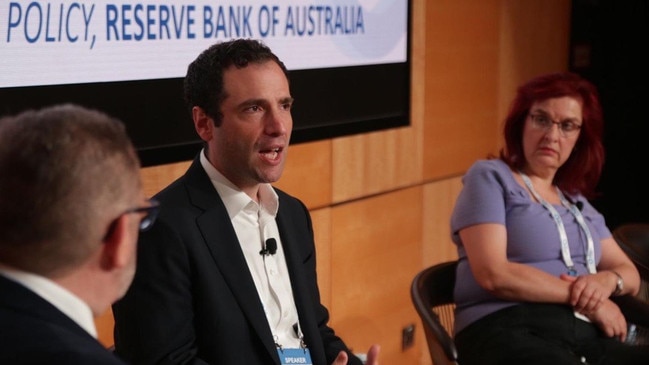ASIC to increase scrutiny of private markets amid valuation concerns
The corporate regulator’s increased focus on private markets comes amid growing investor unease over opaque valuations.

The corporate regulator will ramp up scrutiny of private markets due to concerns about inaccurate asset valuations and lack of transparency, a high-ranking official at the Australian Securities and Investments Commission said.
The move comes as investor unease grows over the gap between public and private asset values, highlighted by a recent public spat between Macquarie and an associate over the silver doughnut’s hefty valuation of a floundering Indian start-up once valued at $US22bn.
ASIC senior executive leader for market infrastructure Benjamin Cohn-Urbach said the regulator will “need” to focus more on how valuations are established and assets are traded in private markets to make sure investors are getting fair outcomes.
“There’s been a shift happening for a while, but I think it has probably really come to the forefront in the last couple of years and it’s obviously not just Australia, it’s a global trend,” Mr Cohn-Urbach told a forum sponsored by the ASX.
“That means there is a pretty significant change to how a lot of these markets operate when you don’t have … buyers and sellers in the same way (as in public markets). That does create new risks.”
One of ASIC’s broad areas of focus is ensuring retirement outcomes out of Australian’s $3.6 trillion super savings are equitable and reflect fair values at all times.
“Clearly a lot of money in Australia is in superannuation and that is for people to live on when they retire. And so without the comfort of the public markets to know that assets are being bought and sold at fair prices, we are going to have to focus more on how a valuation is established, how trades are being done.”
The comments come as Macquarie’s investment banking unit, Macquarie Capital, seemed forced to write down the valuation of its investment in Indian start-up Byju’s after an associate accused it of keeping an inflated valuation in order to charge higher fees.
MacCap will cut the value of the edtech company on its books by about 98 per cent, according to a Bloomberg report that cited sources close to the situation.
This was after Swiss private bank Julius Baer, a Macquarie associate, took the unusual step of writing to Macquarie outlining concerns over its use of an outdated valuation for Byju’s, once India’s hottest start-up.
In May 2022, the company had been valued at $US22bn, but in a letter to Macquarie this January, Julius stressed its own investment in the beleaguered start-up had already been marked down by 80 per cent, yet Macquarie continued to calculate management fees based on the $22bn value.
A Macquarie spokeswoman said the criticism had no basis because the asset is due to be reappraised in April, and management fees for the year will be calculated retrospectively using that updated valuation.
She declined to disclose the size of the writedown for the firm’s investment in Byju’s.
“The fees relating to this matter are calculated retrospectively and charged annually each April and have not been charged since April 2023,” the spokeswoman said.
“When they fall due next month, they will, as part of our normal process, reflect the reduction in the valuation of Byju’s during the past 12 months.”
The case is nonetheless another example of the opacity of private markets at a time when asset managers, superannuation funds and retail investors are all increasing their investments in illiquid private equity, property, infrastructure and credit.
ASIC did not comment on Macquarie’s valuation practices.
“I think we’re not at the point where we know it’s a problem or that clearly regulatory action is needed,” Mr Cohn-Urbach said. “But I think really our focus in the next six to 12 months is just understanding the problem and if there is some action that we need to take.”
Emerging exchanges for unlisted assets also warrant further scrutiny, he said.
The regulator’s comments come amid rising pressure on the Australian Prudential Regulation Authority to strengthen its oversight of private asset valuations by superannuation funds.
Public assets like stocks and bonds have taken a hit from the biggest interest rate hikes in generations over the past two years. However, private investments in infrastructure, property, private equity, and private credit haven’t shown the same movement in valuations.
Sparse reporting by global funds in 2022 and 2023 has shown instances of widely different valuation ranges among funds for the same private assets.
Last September, APRA wrote to superannuation funds outlining areas for improvement, after a plunge in the value of tech darling Canva exposed super funds’ “inadequate” revaluation triggers and gaps in board skill-sets.
At Tuesday’s forum, RBA deputy head of payments policy Nicole Pyner said the central bank was taking a back seat on the issue, for now.
“We have a narrow focus on financial stability and systemic risk, and are not looking at private markets as an area of stability risks at the moment,” she said. “But we need to continue to monitor them and make sure that we’re ready if they do start to pose risks to our financial system.”







To join the conversation, please log in. Don't have an account? Register
Join the conversation, you are commenting as Logout